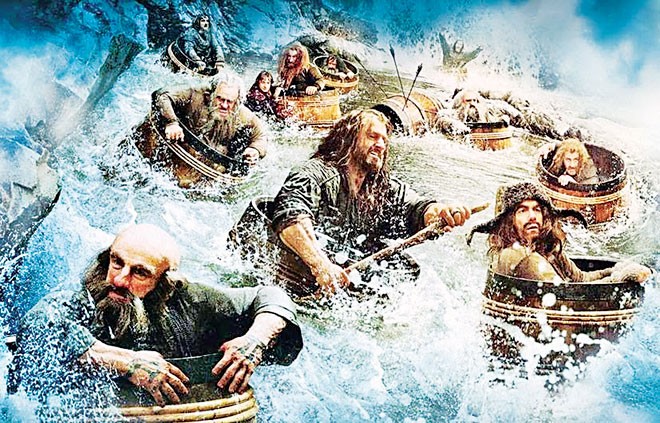

The follow-up to 2012′s An Unexpected Journey, the film sees our beloved hobbit Bilbo (Martin Freeman), wise wizard Gandalf (Ian McKellen), and the twelve Dwarves, continue on their quest to reclaim the Lonely Mountain, where the fiery dragon Smaug hoards a massive treasure amongst which is the Arkenstone, a sacred gem which the company aims to retrieve.
They do eventually reach the Mountain during Desolation’s 160 minutes trudge, but instead of getting there with wit, nuance, and emotional depth, they choose to take the weary, stony route.
At the beginning, the party seeks refuge at the house of skin-changer Beorn (Mikael Persbrandt), but we don’t really get to explore the host or the boarding like we could have. Then they make their way through Mirkwood, and we never get a proper sense of the dangers and vastness of this massive forest. Gone are the twinkling lights and fires in the glades, all discarded in order to insert LOTR veteran Legolas (Orlando Bloom), a new Elf Tauriel (Evangeline Lilly), and a pointless love triangle into the proceedings, and to make room for gimmicks and combat. Lots and lots of combat.
‘Battle must ensue at every turn’ seems to have been the directive for this movie, and subtlety is the first casualty of this decision. Orcs and Elves have been stuffed into the story, while thrusting the titular hobbit and any chances of character development out of the frame. As a result, the movie ends up being so bloated with tired action sequences that it starts to feel like Jackson was on a quest to figure out how many decapitations he could cram into the film without losing its PG-13 rating; the answer, it turns out, is way more than necessary.
It’s Smaug’s eventual appearance that rescues the film and truly stands out as something memorable. The imposing dragon is a vision to behold, stunningly rendered and very intensely voiced by Benedict Cumberbatch. Just like Gollum was the highlight of Journey, Smaug is the most impressive part of Desolation. But while their interactions with Bilbo might feel a bit similar, Gollum compelled with the exploration of his internal conflicts, while Smaug does not get the same kind of treatment. Like much of the film, too much focus is expended on visuals and not enough on the characters. And ultimately it is a pity when even Smaug’s majestic presence degenerates into one of the silliest sequences of the whole series when the Dwarves try to trick the dragon towards the end.
It is also unfortunate that Bilbo has been marginalized in his own movie. Martin Freeman continues to make a charming Bilbo, but the filmmakers don’t pay as much attention to him as they should have; the ring’s affect on him, in particular, remains to be examined. And the rest of the cast, in general, is also impressive. Ian McKellen’s take on Gandalf, who goes off to pursue the Necromancer in this chapter, is as powerful as ever. And Benedict Cumberbatch, of course, is remarkable as Smaug.
But, like it has been said countless times already, taking the slender, playful children’s novel and reimagining it as an epic trilogy in the same vein as LotR wasn’t exactly the best idea that anyone’s ever had. That, however, isn’t the biggest problem here – the execution could still have been better than what we’ve seen in the first two instalments. The film needed more Bilbo, less Orcs and Elves, no love triangles, and absolutely no dialogues about searching anybody’s trousers. And it wouldn’t have hurt if less focus was placed on action and more on character building. There is a middle ground between being overly constrained by the original material and overusing your creative licence and taking pointless liberties, and The Desolation of Smaug fails to find that balance; at times it starts to feel like fan fiction, and not particularly good one.
If The Desolation of Smaug was an average fantasy movie, then it might not have seemed like such a letdown, and if it was just another blockbuster then the director and writers’ choices would have made more sense.
For the casual view, Desolation might still seem like an improvement over the sluggish Journey, and if you want to view it as merely another commercial action adventure then you might enjoy the proceedings.
But for readers familiar with the original story, especially those who have some sentiments attached to it, as well as viewers who place importance on nuance and character development, this instalment is a further step in the wrong direction. No, it isn’t a complete mess, and yes, Smaug’s presence makes it worth a watch, but if the series has failed to charm you so far, then this desolation of Tolkien’s The Hobbit will feel like a long, cluttered, tedious slog that could have potentially been much more compelling.